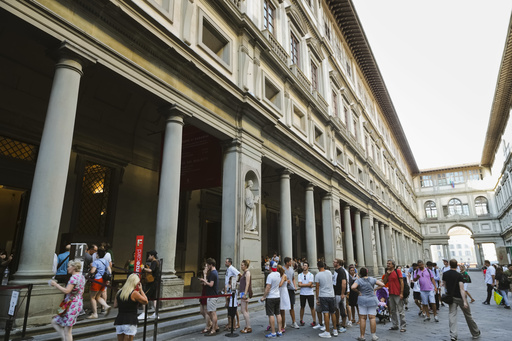
ROME — The city of Florence has unveiled a set of new initiatives aimed at addressing the issue of overtourism, coinciding with the convening of the Group of Seven tourism ministers in this historic city. These measures come as the Italian government seeks to elevate the nation’s status as a premier tourist destination.
Under the direction of Mayor Sara Funaro, a 10-point plan has been adopted, which includes a prohibition on key boxes in the historic district and an outright ban on tour guides using loudspeakers. This information was disclosed in an official statement from the City Hall.
Key boxes—digital containers utilized by owners of short-term rental properties for convenient key exchanges—have become emblematic of the residents’ frustration towards the influx of tourists. Since the lifting of COVID-19 restrictions, tourist numbers have surged, exacerbating local tensions. In a recent demonstration, residents expressed their anger by placing red Xs on the key boxes, reflecting dissatisfaction with how the city center has been dominated by transient vacation rentals, which many feel have pushed out both local inhabitants and traditional businesses.
National data released by the statistics office ISTAT indicates that 2023 marked a record year for tourism in Italy, with 134 million visitors and 451 million overnight stays logged in hotels and similar accommodations. Notably, there was a nearly 17% increase in guests choosing non-hotel lodgings compared to 2022, as noted in a report published in June.
Italy ranks fourth in the U.N. World Tourism Barometer, trailing behind France, Spain, and the United States. The tourism sector has been a significant contributor to the Italian economy, accounting for about 10.5% of the nation’s gross domestic product in 2023, according to findings from Statista.
Florence, which has a long-standing governance by center-left parties, imposed a ban on new short-term rentals in the city center last year. This move aimed to curtail the exodus of local residents and has led to continuous calls for national regulations from the current right-wing administration, led by Premier Giorgia Meloni. The proposed regulations would restrict property rentals to a maximum of 120 days per year.
To date, Venice is the only Italian city granted the authority to regulate short-term rentals, having faced similar challenges from overwhelming tourist numbers. This year, Venice has begun implementing a tax on day-trippers to better manage tourist flows.
The political differences surrounding the management of tourism in Florence may come to the forefront during the G7 tourism ministers’ meeting, which begins Wednesday. At a preparatory event held this past weekend, Tourism Minister Daniela Santanche acknowledged that some historic cities are indeed burdened by excessive visitor numbers. Still, she emphasized that Italy is not fully harnessing its tourism potential and could benefit from an annual increase of 50 million visitors.
Santanche also expressed disappointment with Italy’s fourth-place ranking in global tourist destinations, advocating for a sustainable approach that fosters quality tourism offerings. “We can grow much more, we can develop much more,” she asserted, adding that the tourism sector could potentially become a dominant industry in the nation.
